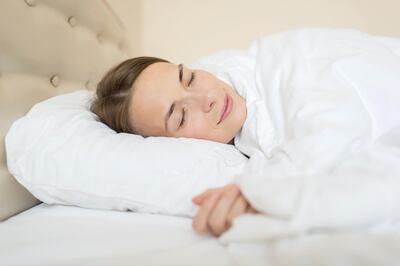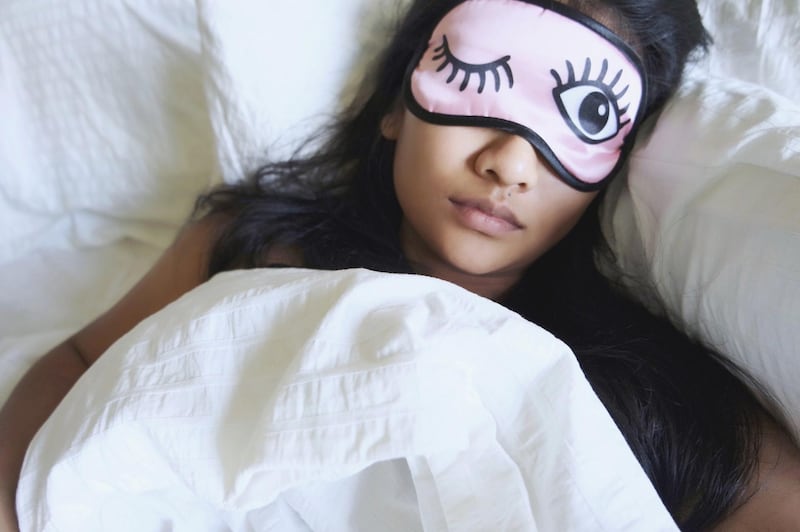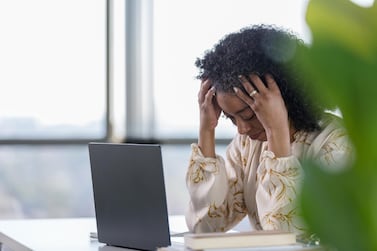Last night, I found myself back at school, about to sit for a math exam I had not studied for. Panic sets in as I realise I had also not been to a single class all term, and as I turned the pages of the exam paper in front of me, the equations were a foreign language to me. There was a comforting swell of relief as I woke up to find myself at home in my bedroom, not in the dusty school hall where I had been minutes earlier. I had visited the same hall in my dreams last week, too, although that time, it was an English exam.
If you have had vivid and stressful dreams over the past few weeks, you are not alone. One quick search through social media will bring up dozens of accounts from people who are experiencing unusual dream patterns, and have been since the start of the coronavirus pandemic.
It's understandable, of course. Most of us will have experienced vast changes to our everyday lives. Routines have gone out the window, homes have become offices, and the daily conveyor belt of faces and landscapes we pass has decreased dramatically. It's only natural that our dreams will have changed, too.
“It is a mystery to science and psychology why people dream,” explains Dr Saliha Afridi, clinical psychologist at Dubai’s Lighthouse Arabia Centre for Wellbeing. “Many believe dreams serve a very important function for our psyche to be able to process all the emotions and events that we are not able to process in our waking life.”
Right now, many of us will be dealing with new and unfamiliar emotions, as the world collectively processes the reality of living through a global pandemic. Stress, anxiety and worry, paired with frustration and boredom, means our minds have a lot to process during the day, the knock-on effect of which we are feeling at night.
“I am not surprised to hear that people are experiencing strange and even frightening dreams at this time because our minds have never experienced an event like Covid-19,” says Afridi. “Never before in our lifetime, and never again probably in our lifetime, will we experience this, so it is very normal for our conscious and unconscious mind to try to organise and make sense of these happenings.”
And when daily happenings are largely negative, it means you are likely to have unpleasant or stressful dreams. “At night, our subconscious mind, which is 90 per cent of our mind and a bit like the hard drive of a computer, does not have the logical filter and stores all the negative information from the day and subsequently is out of control,” says Annie Browne, consultant clinical hypnotherapist and psychotherapist at AB Mindworks Dubai. “It wants to keep us safe, but perceives the negative information that we have stored during the days and weeks as a serious threat to ourselves and our loved ones and subsequently distorts the reality to become very vivid and sometimes frightening.”

While our dreams might not have any immediate correlation to things that are worrying us in our everyday life, therapeutic dreamwork and hypnotherapy specialist Kevin Hinchliffe, who works in London, explains that the subconscious mind thinks in images and feelings. The brain's way of making sense of it all is to connect them with a story, however bizarre, which will produce a similar feeling. If that feeling is negative, it is more likely to become a vivid and memorable dream. Likely, a nightmare.
“The reason many people are having strange and vivid dreams at the moment is their subconscious awareness of the threat to changes in their life due to the current global situation,” Hinchliffe explains. “The images will not necessarily appear to be directly related to the situation, but the underlying feeling will be worth acknowledging.”
Take, for example, my recurring exam dream. “This is a common anxiety dream. I’ve had almost the same dream myself, although it related to School of Architecture submissions,” he says. “What I would ask you primarily is ‘what is it about your present life situation that you feel unprepared for?’"
He adds that the dream could be an indication of feeling isolated or lonely, as well as concerns in your professional life. All things that, I’m sure, many will have thought about since the coronavirus outbreak started.

While we of course are able to separate dreams from reality, that doesn’t stop adrenalin pumping through our bodies long after we wake, or make the emotions a dream sparks, any less real.
"Our subconscious mind knows more about us than anyone else, however, it cannot tell the difference between what is false and what is reality," explains Browne. "Have you ever cried at a sad movie or felt your heart rate get faster at a horror? You know it's only a movie, but you are having a physical and emotional reaction; it is difficult to control our thoughts and dreams. We can learn to manage them, however, and this is where hypnotherapy and psychotherapy can help."
Browne advises trying to identify feelings that are making you anxious when you are awake, and to draw up a stress-relieving strategy or adopt a technique, such as meditation, to help you manage anxiety, in turn managing your dreams. It is also advised that we are as active as possible during the day, tiring out our bodies to ensure a deeper state of sleep.
“Usually the first few hours of our cycle constitute deep sleep as the brain recovers from the tiredness of the day and resets energy levels; the second part of the night is when we dream,” Dr Hady Jerdak, sleep specialist and chief executive of Harley Street Medical Centre in Abu Dhabi, explains.
“However, these days we are not as tired, as there is more sitting around and staring at screens. This, compounded by the stress we may be feeling, leads to more dreams at night. The best way to combat this is by tiring out your body during the day with physical activity, and avoiding screens at night.”
And, if you do wake up from a bad dream, Browne has a foolproof technique to send her back to a calm, peaceful rest.
“Focus on your breathing and start to imagine you are in a place where you felt relaxed and calm,” she says. “It may be a holiday location, your wedding day, a special occasion – play it through your mind like a video. If other thoughts come into your mind, let them go through and come back to focus on your ‘video’. I play a perfect round of golf if I cannot sleep. I rarely get to hole four and I’m asleep again.”








